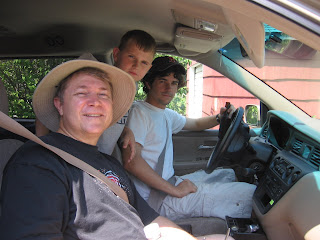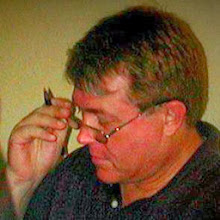
I spent today primary reading Ricoeur's essay Phenomenology and Hermeneutics. One of the main ideas Ricoeur advances in this essay is the interdependency of these distinct disciplines. You can find the essay in John Thompson's collection of Ricoeur's writings titled:
Hermeneutics & the Human Sciences .From this reading I attempted to construct a hermeneutic phenomenological philosophic foundation for
The Revelation to John as the data source for my study.
Here's what I wrote:
Hermeneutic phenomenology provides the philosophic framework for this study. The goal of hermeneutic phenomenology is to describe and interpret lived experience. Hermeneutic phenomenology always asks questions concerning the meaning or nature of being in the world (Van Manen, 1990).
Ricoeur (1981) underscores the parallel nature of hermeneutics and phenomenology in the following definitions:
Phenomenology begins when, not content to ¨live¨ or ¨relive¨, we interrupt lived experience in order to signify it. . . . Hermeneutics similarly begins when, not content to belong to transmitted tradition, we interrupt the relation of belonging in order to signify it. (pp. 116, 117)
Hermeneutic phenomenology is concerned with interpretation of lived experience. However, what is open to philosophical reflection is lived experience within the “lingual condition of all experience” (p. 115).
Lived experience ultimately finds lingual expression (oral or written). However, there is a mediating stage, the “epoché”. The epoché is that moment of interruption with lived in experience in which the subject signifies the experience linguistically. Ricoeur (1981) remarks that “hermeneutic philosophy begins with the experience of art” (p. 117). By an “experience of art”, Ricoeur refers to the epoché as a creative process that is “the virtual event, the imaginary act . . . by which we exchange signs for things and signs for other signs” (p. 116). This creative event – art – precedes and supports the linguistic expression of life experience. In the epoché, the subject distances self from experience in order to interpret the experience and present it symbolically for self and others.
Likewise, Ricoeur (1981) proposes that the hermeneutic counterpart of lived experience is “consciousness exposed to historical efficacy” (p. 117). The hermeneutic counterpart of epoché is “distanciation”. In distanciation, the subject find “empty space” between self and his or her participation in a historic tradition in which to construct the signification of the historical tradition, to which he or she belongs, for self and others. In the same sense that the creative epoché precedes and supports language, it is “the interplay of distance and proximity, constitutive of the historical connections, is what comes to language rather than what language produces” (p. 118).
Ricoeur (1981) identifies the common source of meaning in phenomenology and hermeneutics when he writes, “The reference of the linguistic order back to the structure of experience (which comes to language in the assertion) constitutes, in my view, the most important phenomenological presupposition of hermeneutics” (p. 118). The hermeneutic phenomenologist is concerned with describing and understanding the background structure of experience through the foreground representation of the linguistic expression of experience. Consequently, the philosophical reflection of hermeneutic philosophy revives this “empty space” where the creative epoché and distanciation occur “to render thematic what was only operative, and thereby makes meaning appear as meaning” (p. 116).
Language as the mediator of lived experience opens up the possibility that the interpretation of any linguistic of expression of the nature of human being within chaotic, nihilistic, or apocalyptic realties could be informative for a hermeneutic phenomenological exploration of the research question at hand. Likewise, language as a mediator of historical connection makes it possible to “render present the historical past.” This hermeneutic phenomenology philosophy undergirds the choice of The Revelation to John as an appropriate data source for this study.
References
Ricoeur, P. (1981). Hermenutics and phenomeology (J. B. Thompson, Trans.). In J. B. Thompson (Ed.), Paul Ricoeur hermeneutics and the human sci-ences: Essays on language, action, and interpretation. New York: Cam-bridge University Press.
Van Manen, M. (1990). Researching lived experience: Human science for an action sensitive pedagogy. Albany, NY: State University of New York Press.






















